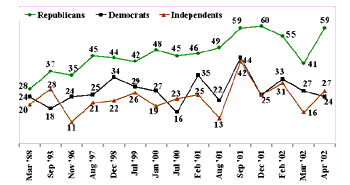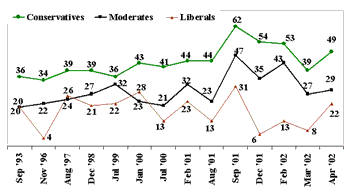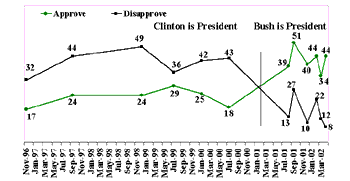GALLUP NEWS SERVICE
PRINCETON, NJ -- Recently some news commentators have noted that the politics and conflict in the Middle East have made strange bedfellows. In the current confrontation between the Israelis and the Palestinians, American Jews are rallying support for Israel and are being supported most strongly, it appears, by conservatives and Republicans. Since Jews are overwhelmingly liberal and Democratic -- they voted four-to-one for Gore over Bush in the last presidential election -- this expression of support across the ideological divide is perceived by some commentators as unusual. But an analysis of Gallup polls over the past decade and a half suggests that conservatives and Republicans in this country have persistently provided at least more verbal support for Israel than have Democrats and liberals.
Since 1988, when Gallup first asked Americans if their sympathies lay more with the Israelis or with the Palestinian Arabs, more Americans have sided with the Israelis than with the Palestinians. The percentages have varied, but the margin in favor of the Israelis has never fallen below 22 percentage points, while it reached a high of 48 points in the immediate aftermath of the Sept. 11 terrorist attacks in the United States. In the last 14 years, Republicans have always expressed relatively more sympathy for the Israelis over the Palestinians than have the Democrats. Similarly, the margin of support for Israelis has always been higher among conservatives than among liberals.
Middle East Sympathies Compared by Party
When Gallup first asked the question about people's sympathies in 1988, Republicans chose the Israelis by a margin of 43% to 15% -- a 28-point difference. Democrats expressed the same preference, although by a slightly smaller margin of 37% to 13% -- a 24-point difference. Five years later, in September 1993, the Israeli advantage among Republicans had climbed to 37 percentage points (49% to 12%), while among Democrats it had declined to 18 points (37% to 19%). Throughout the 1990s, Republicans consistently gave larger margins of support to the Israelis over the Palestinians than did the Democrats. Independents most often gave somewhat smaller margins of support than Democrats.
| Sympathies in the Middle East: Margin in Favor of the Israelis Over the Palestinians Compared by Party |
 |
After the Sept. 11 attacks in the United States, support for the Israelis surged, but since then it has dropped considerably among independents and Democrats, while it has fluctuated among Republicans. In the last poll Republican support surged to the high levels it reached last fall.
Middle East Sympathies Compared by Political Ideology
The following chart shows a similar pattern among conservatives, moderates and liberals. The margins of support for the Israelis over the Palestinians are consistently and significantly higher among conservatives than among moderates, the next most supportive group. Liberals typically give the least amount of support, although there were two points in time when liberals gave slightly more support than moderates.
| Sympathies in the Middle East: Margin in Favor of the Israelis Over the Palestinians Compared by Ideology |
 |
All three ideological groups show a surge in support after the Sept. 11 attacks in the United States, as well as a decline over the next few months. Still, the chart makes clear that conservatives continually express higher levels of sympathies for the Israelis than does either of the other two ideological groups.
Middle East Sympathies Compared by Approval of the President
Despite the largely Democratic orientation of American Jews, both Republican and Democratic presidents have followed foreign policies that are widely viewed as favoring Israel over its Arab nations. Thus, it might be expected that the president would have some influence over the attitudes of Americans toward Israel -- with those who generally approve of the president (the way he handles his job) indicating greater support for Israel than those who disapprove.
| Sympathies in the Middle East: Margin in Favor of the Israelis Over the Palestinians Compared by Presidential Approval |
 |
But a review of Gallup polls finds that presidential approval is not related to support for Israel. As shown in the accompany chart, among those who approved of the way Bill Clinton handled his job as president, there was less relative support for Israel over the Palestinians than among Americans who disapproved of Clinton. Once George W. Bush assumed office, however, those who approve of his performance are more supportive of Israel than those who disapprove.
These results are consistent with the findings that political party and ideology are the factors that most strongly correlate with Middle East sympathies. As is well known, presidential approval is highly correlated with party and ideology. Democrats and liberals were much more likely to approve of the job being done by Clinton than were Republicans and conservatives, with the mirror image pattern occurring once Bush became president. These underlying patterns seem to be the most important. Any influence that an administration's generally pro-Israel policy might have on those who approve of that president, it appears, is minimal in the face of the strong underlying influence of party and ideology.
Race and Middle East Sympathies
A special analysis of the current poll shows that of all the possible factors that appear to be associated with one's sympathies, three are statistically most important: party affiliation, ideology and race, in that order. Although there are differences in support among Americans when compared by level of income, gender, education, age and geographical location (urban vs. rural), these factors are all of minimal influence in comparison with these three.
With respect to race, white Americans support Israelis over Palestinians by a margin of 54% to 12% -- a 42-point margin. Blacks and other minorities, by contrast, support Israelis by just a 13-point margin, 38% to 25%.
|
Sympathies in the Middle East are with: |
Advantage to Israelis |
||||
|
Israelis |
Palestinian |
No |
Total |
||
|
Overall |
50% |
15 |
35 |
100% |
35 |
|
Party |
|||||
|
Republicans |
67% |
8 |
25 |
100% |
59 |
|
Independents |
43% |
16 |
41 |
100% |
27 |
|
Democrats |
45% |
21 |
33 |
100% |
24 |
|
Ideology |
|||||
|
Conservatives |
59% |
10 |
31 |
100% |
49 |
|
Moderates |
48% |
19 |
33 |
100% |
29 |
|
Liberals |
41% |
19 |
40 |
100% |
22 |
|
Race |
|||||
|
White |
54% |
12 |
34 |
100% |
42 |
|
Non-white |
38% |
25 |
37 |
100% |
13 |
Survey Methods
The latest results are based on telephone interviews with – 1,009 national adults, aged 18+, conducted April 5-7, 2002. For results based on the total sample of national adults, one can say with 95% confidence that the margin of sampling error is ±3 percentage points. In addition to sampling error, question wording and practical difficulties in conducting surveys can introduce error or bias into the findings of public opinion polls.
In the Middle East situation, are your sympathies more with the Israelis or more with the Palestinian Arabs?
|
|
Palestinian Arabs |
|
Neither |
No |
||
|
% |
% |
% |
% |
% |
||
|
2002 Apr 5-7 |
50 |
15 |
9 |
17 |
9 |
|
|
2002 Mar 8-9 |
43 |
14 |
6 |
20 |
17 |
|
|
2002 Feb 4-6 |
55 |
14 |
6 |
14 |
11 |
|
|
2001 Dec 14-16 |
51 |
14 |
5 |
17 |
13 |
|
|
2001 Sep 14-15 |
55 |
7 |
4 |
20 |
14 |
|
|
2001 Aug 10-12 |
41 |
13 |
7 |
18 |
21 |
|
|
2001 Feb 1-4 |
51 |
16 |
7 |
14 |
12 |
|
|
2000 Oct 13-14 ^ |
41 |
11 |
9 |
18 |
21 |
|
|
2000 Jul 6-9 |
41 |
14 |
5 |
18 |
22 |
|
|
2000 Jan 25-26 |
43 |
13 |
5 |
21 |
18 |
|
|
1999 Jul 22-25 |
43 |
12 |
11 |
19 |
15 |
|
|
1998 Dec 4-6 |
46 |
13 |
5 |
22 |
14 |
|
|
1997 Aug 12-13 |
38 |
8 |
5 |
19 |
30 |
|
|
1996 Nov 21-24 |
38 |
15 |
6 |
14 |
27 |
|
|
1993 Sep 10-12 |
42 |
15 |
6 |
17 |
20 |
|
|
1991 Feb |
64 |
7 |
19 |
-- |
10 |
|
|
1989 Aug |
50 |
14 |
15 |
-- |
21 |
|
|
1988 May 13-15 |
37 |
15 |
22 |
-- |
27 |
|
|
^ |
Based on interviews with 821 national adults; +/- 4 pct. pts. |
|||||
